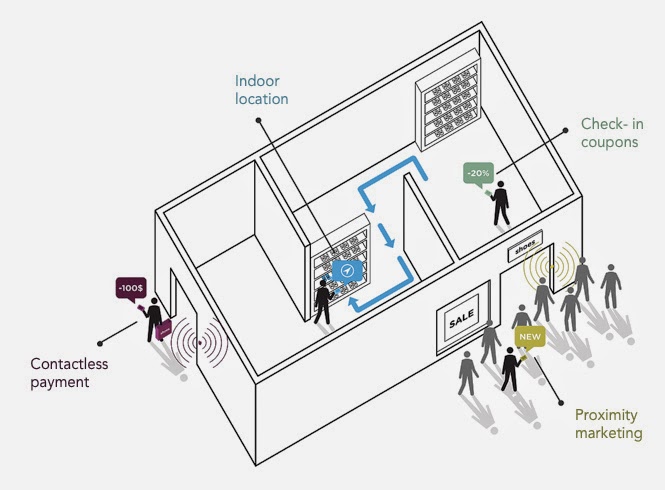If you haven’t heard or read about iBeacons yet – you will. It is a game changer for shopping and is driving innovation in Proximity Marketing. The question is will consumers like the experience or think its creepy?
“iBeacons will personalize the customer experience.”
Stores that are indoors often block cell signals and make it nearly impossible to locate devices via GPS. iBeacons are a good solution because they are:
- a low-cost piece of hardware
- small enough to attach to a wall or countertop
- use battery-friendly, low-energy Bluetooth connections to transmit messages or prompts
They are positioned to transform how retailers and businesses communicate with people indoors. Consumers might even want to deploy them as part of home automation systems.
iBeacons will engage the retail experience for consumers by letting companies market to them based on their precise location. For example, if I’m standing in the camera section at a Best Buy and my location is picked up, they can send me a message to my phone asking if I need help, or offering a discount offer for immediate purchase for a camera.
“77 percent of consumers said they’d be OK with sharing location data”
But isn’t that a little bit creepy? In fact, while people say they are concerned with privacy, a recent survey of 1,000 U.S. adults showed that 77 percent of consumers said they’d be OK with sharing location data in exchange for something of value.
Proximity Marketing – 3 iBeacon Facts that is changing the future of retail
1. iBeacons use Bluetooth Low Energy
iBeacons utilize Bluetooth Low Energy, a new variant of Bluetooth technology that allows two-way communication between devices using a triangular pattern over shorter distances. This way, businesses can set up the iBeacon transmitters that have signals up to 500 feet away without Wi-Fi, GPS, or 3G/4G, and use much less energy to do it. T
2. Apple is integrating iBeacons into its retail stores
Apple introduced iBeacon at last year’s WWDC with iOS 7. Since then, they have integrated it into 254 Apple retail stores to help with store events, Genius Bar appointments, and online orders. The service works with an app, which is available for download and detects users when they enter the store. For example, if you were standing next to the iPhone table, the app may ask you if you would like an upgrade because you don’t have the latest model and it noticed you kept going back to the display.
3. Companies want iBeacons for the big data
Businesses and retailers now have a direct way to find out what customers are doing, and can pinpoint exactly where in the store they are doing it. Think of the opportunity for big data here — a company can find out your microlocation, what you’re looking at, how long you’re looking at it, and maybe what you decided to buy at the last second instead. That way, they can send you personalized messages and can utilize coupons or other deals more effectively.
“For the consumer experience, iBeacon is more about proximity, more than location.”
Creep Factor
So do you want to be followed and told what to do? When you’re in the middle of shopping do you want a message coming through like its reading your mind? Maybe.
Although Apple said the iBeacon is simply a location tool and doesn’t gather excessive data or track users. Privacy remains a concern that consumers and businesses will have to confront. The apps on your phone that sync with an iBeacon respond to those signals so retailers get that information. Of course, you can turn the location settings off on your phone, but you can consider that location data as personal data that the store has access to.
Estimote is one of the biggest makes of iBeacons and the technology. They are currently piloting our sensor technologies with the largest retailers in the USA and Europe. The opportunities are endless — from in-store analytics, through proximity marketing, indoor navigation to contactless payments. Whatever the application, the goal remains the same: to bring the richest possible customer experience to retail consumers. Sadly Android can only pick up the signals but cant interact at this point.
